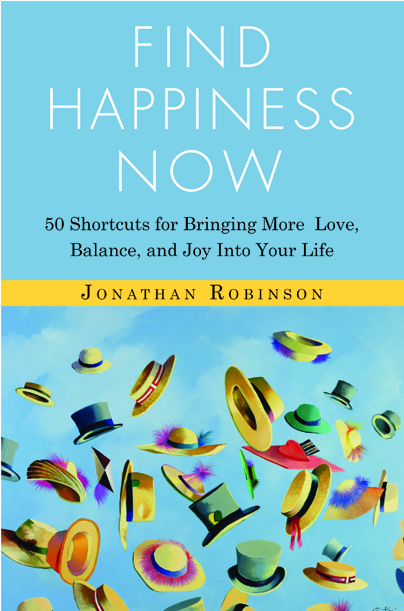 It’s that time of the year again to make resolutions. Instead of making them and then breaking them like most people do, why not put some punch behind your resolutions? I helped invent a method that practically guarantees your resolutions will be kept. The technique, which I call the Integrity Contract, helps people stay motivated when the going gets tough. After all, it is only people who are consistent over a long period who ultimately succeed in life
It’s that time of the year again to make resolutions. Instead of making them and then breaking them like most people do, why not put some punch behind your resolutions? I helped invent a method that practically guarantees your resolutions will be kept. The technique, which I call the Integrity Contract, helps people stay motivated when the going gets tough. After all, it is only people who are consistent over a long period who ultimately succeed in life
In order to make consistent progress towards one’s goals, we need some form of immediate pain to occur if we fail to take appropriate action. If every time you failed to exercise three times a week you cut off a finger, you’d be a lot more consistent! Since no sane person would ever do that, you need to find an immediate pain you would be willing to give to yourself if you fail to act in beneficial ways. After much trial and error, I found a solution that worked. In the last fifteen years, I’ve taught the Integrity Contract method to thousands of people, and the results have been astounding. Here’s the essence of the technique:
Write a contract with yourself that states all the precise actions you’re willing to commit to do during the following week. Then write a statement that says, “For each of the items on this contract I fail to do by one week from today, I agree to rip up $2.” Finally, sign your contract, date it, and place it in a place you’ll see it every day. That’s it. Here’s an example of a simple contract:

“During the next week, I will exercise 3 times for a minimum of forty minutes. I will read a minimum of sixty pages from the book I got on investing. I will meditate for at least twenty minutes each day. For each task I don’t complete by January 7th, I will rip up $2.”
There are several reasons why this method is so effective. First, there is a clear proclamation of what you intend to do, and by when you intend to do it. Normally, people have a lot of lofty thoughts about what they could do to improve their life (aka New Year’s Resolutions), but these thoughts soon slip away. With the Integrity Contract method, you’ll have a visual reminder of what you’re committed to do. Second, with this technique, you’ll experience immediate pain if you fail to keep your word. Since your brain is always trying to avoid immediate pain, it will do its best to complete what’s on the contract.
As far as I’m concerned, it’s fine to not complete everything on your contract–as long as you rip up the money for the tasks you don’t finish. I’ve seen that, as long as people are willing to rip up money for failing to complete their contract, the method eventually works. Maybe not the first or second week, but by the third week you’ll find your mind screaming at you to complete whatever you wrote down.
Below is another example of how such a contract looks:
I, Jonathan, agree to do the following over the course of the next week:
a) Call five potential clients about my new seminar.
b) Wash my car, and put an ad in the paper to sell it.
c) Ask a friend to read my latest article and get their feedback.
d) Start a savings account to save money for a vacation to Europe.
For each of the above items I fail to complete by 5:00 p.m. next Thursday, I agree to rip up $2.
(date) (signature)________________________
Then put the contract in a place where you will see it daily. Bathroom mirrors are good. So are car dashboards. At the end of the week, evaluate how you did. If you did not complete any items on your contract, no matter what your excuse, tear up the appropriate amount of money.
Think of how quickly you could turn your goals into a reality if you made progress on them each week. Let this year be a year in which you keep your resolutions and your promises to yourself. People who have the patience to slowly but surely make progress on their goals are the people who succeed in life.
As an added way to make sure you get support to turn your New Year’s resolutions and dreams into reality, I am offering a Free teleconference call on January 2nd.
It’s called “The Best Ways to Increase Happiness
 Lastly, feel free to pass this blog on to your friends and family. Wouldn’t it be great if they also started the New Year off on the right foot? Then, you could support each other towards making 2014 an amazing year of growth, love, and joy. By signing up for my free preview call and/or signing up for my “Happiness Through Great Relationships” Course, you’ll be giving your friends and family an opportunity to make 2014 their best year yet.
Lastly, feel free to pass this blog on to your friends and family. Wouldn’t it be great if they also started the New Year off on the right foot? Then, you could support each other towards making 2014 an amazing year of growth, love, and joy. By signing up for my free preview call and/or signing up for my “Happiness Through Great Relationships” Course, you’ll be giving your friends and family an opportunity to make 2014 their best year yet.
Sign up for FREE PREVIEW call here:
Finding Happiness Increase Happiness Through Great Relationships
Sign up here for: Finding Happiness Through Great Relationships course
 What do you want in life? You may think it’s money, or a hot relationship or a better job, but why do you want those things? Because you think if you had them, you’d be even happier. I call this belief the “as soon as” method for finding happiness. You think “As soon as I have more money, or as soon as I lose 10 pounds, or as soon as I find my soul mate, THEN I will be happy.” I have good news and bad news for you. First, the bad news: if you are a member of the “as soon as” approach to finding happiness, you’ll never be happy for long.
What do you want in life? You may think it’s money, or a hot relationship or a better job, but why do you want those things? Because you think if you had them, you’d be even happier. I call this belief the “as soon as” method for finding happiness. You think “As soon as I have more money, or as soon as I lose 10 pounds, or as soon as I find my soul mate, THEN I will be happy.” I have good news and bad news for you. First, the bad news: if you are a member of the “as soon as” approach to finding happiness, you’ll never be happy for long.

 One day I called up my friend, Susan, and asked her how she was. She said, “Things are great. Joe and I just got back from another week long vacation.” I realized that, just about every time I talked to Susan, she had recently gone on vacation. I was a bit annoyed and jealous. “How do you take so many vacations?” I asked. Her reply made me even more annoyed, “We simply make it a priority.” I felt a certain amount of self-pity as I shot back, “Boy, I wish my life was set up so I could take so much time off.” In a compassionate, yet direct manner, Susan replied, “You can if it’s important enough to you. Joe and I just decided we’d take eight weeks off each year. There’s a lot of resistance to doing that, but we’re committed to living the life that we want to live.”
One day I called up my friend, Susan, and asked her how she was. She said, “Things are great. Joe and I just got back from another week long vacation.” I realized that, just about every time I talked to Susan, she had recently gone on vacation. I was a bit annoyed and jealous. “How do you take so many vacations?” I asked. Her reply made me even more annoyed, “We simply make it a priority.” I felt a certain amount of self-pity as I shot back, “Boy, I wish my life was set up so I could take so much time off.” In a compassionate, yet direct manner, Susan replied, “You can if it’s important enough to you. Joe and I just decided we’d take eight weeks off each year. There’s a lot of resistance to doing that, but we’re committed to living the life that we want to live.”  It’s a rainy, sleepy afternoon, and you’re stuck in front of your computer. Your bones are weary, your eyes
It’s a rainy, sleepy afternoon, and you’re stuck in front of your computer. Your bones are weary, your eyes  Setting and achieving goals is perhaps the most documented technique for manifesting what you want—efficiently and effectively. Since writing your goals is so powerful, it’s important to know precisely what you want to create so you will be pleased when you get it. If you don’t specify your dreams clearly enough, you can end up creating a nightmare. Sometimes people who write down their goals do create a life that is out of harmony. Why? Because their goals are all outward goals—such as making more money. Yet, manifesting more money
Setting and achieving goals is perhaps the most documented technique for manifesting what you want—efficiently and effectively. Since writing your goals is so powerful, it’s important to know precisely what you want to create so you will be pleased when you get it. If you don’t specify your dreams clearly enough, you can end up creating a nightmare. Sometimes people who write down their goals do create a life that is out of harmony. Why? Because their goals are all outward goals—such as making more money. Yet, manifesting more money  create a balanced goal, you need to know two things. First, you need to know exactly what you’d like to manifest in the material world. Second, you want to identify what you hope to experience as a result of achieving your external goal. The easiest way to know what
create a balanced goal, you need to know two things. First, you need to know exactly what you’d like to manifest in the material world. Second, you want to identify what you hope to experience as a result of achieving your external goal. The easiest way to know what  that in the above example with Sarah, I had her create an internal way to measure her progress towards more security and comfort. You can always improve what you can measure. Although creating an “intuitive 1 to 10 scale” is not absolutely precise, I’ve found that people say it works surprisingly well in measuring their progress. All you need to do is rate, on an internal 1 to 10 scale, how you’re currently doing in the area you want to work on. Then, about once a week ask yourself, “How am I now doing (on a 1 to 10 scale)?” Hopefully, you’ll see gradual improvement. If not, it may mean you need to do different tasks in order to be more successful.
that in the above example with Sarah, I had her create an internal way to measure her progress towards more security and comfort. You can always improve what you can measure. Although creating an “intuitive 1 to 10 scale” is not absolutely precise, I’ve found that people say it works surprisingly well in measuring their progress. All you need to do is rate, on an internal 1 to 10 scale, how you’re currently doing in the area you want to work on. Then, about once a week ask yourself, “How am I now doing (on a 1 to 10 scale)?” Hopefully, you’ll see gradual improvement. If not, it may mean you need to do different tasks in order to be more successful. Armed with the secret information I am about to reveal to you, you will soon have incredible power in making friends and business contacts. Since these human technologies are so powerful, I must first give you some warnings as to how to use them. Please don’t use the ideas I’m about to divulge as a way to manipulate people. If you do, people will eventually see through your charade. Instead, consider these tools for connecting with people as a way to extend your good, caring intentions. If you use these methods with good intentions, you and the people you connect with will be amply rewarded.
Armed with the secret information I am about to reveal to you, you will soon have incredible power in making friends and business contacts. Since these human technologies are so powerful, I must first give you some warnings as to how to use them. Please don’t use the ideas I’m about to divulge as a way to manipulate people. If you do, people will eventually see through your charade. Instead, consider these tools for connecting with people as a way to extend your good, caring intentions. If you use these methods with good intentions, you and the people you connect with will be amply rewarded.  Why do people travel half way around the world to visit a place such as Disneyland, pay $125 to get in, and stand in line for an hour for a three minute ride? Because, as human beings, we crave peak moments. The desire for an intense, special, extraordinary experience is one of our deepest desires. That’s one of the major reasons why we like sex, falling in love, winning a big game, and weddings. Yet, peak moments need not be reserved for such major events. You can learn to create them in daily life with people you care about. Once you learn the skill of creating special times for other people, your relationships will never be the same. People will want to know you, do business with you, and even marry you because you know how to create a sense of aliveness wherever you are. There are four key concepts that can help you create more peak moments with your friends, mate,
Why do people travel half way around the world to visit a place such as Disneyland, pay $125 to get in, and stand in line for an hour for a three minute ride? Because, as human beings, we crave peak moments. The desire for an intense, special, extraordinary experience is one of our deepest desires. That’s one of the major reasons why we like sex, falling in love, winning a big game, and weddings. Yet, peak moments need not be reserved for such major events. You can learn to create them in daily life with people you care about. Once you learn the skill of creating special times for other people, your relationships will never be the same. People will want to know you, do business with you, and even marry you because you know how to create a sense of aliveness wherever you are. There are four key concepts that can help you create more peak moments with your friends, mate,  Perhaps the most important thing a human being can learn is how to quickly let go of negative thought patterns and emotions and quickly return to the peace and love that’s hidden behind our turbulent minds. Once you can do this well, everything in your life changes. In my exploration of how doing this effectively, I’ve tried a lot of things. One of my absolute favorite ways to quickly return to a place of peace (after being upset) is to use something called “The Sedona Method.” What follows is a mini-course on the Sedona Method. If you try this out and like it, I recommend that you get the book “The Sedona Method,” so you can get a better understanding of this truly effective and simple technique.
Perhaps the most important thing a human being can learn is how to quickly let go of negative thought patterns and emotions and quickly return to the peace and love that’s hidden behind our turbulent minds. Once you can do this well, everything in your life changes. In my exploration of how doing this effectively, I’ve tried a lot of things. One of my absolute favorite ways to quickly return to a place of peace (after being upset) is to use something called “The Sedona Method.” What follows is a mini-course on the Sedona Method. If you try this out and like it, I recommend that you get the book “The Sedona Method,” so you can get a better understanding of this truly effective and simple technique.  It’s that time of the year again to make resolutions. Instead of making them and then breaking them like most people do, why not put some punch behind your resolutions? I helped invent a method that practically guarantees your resolutions will be kept. The technique, which I call the Integrity Contract, helps people stay motivated when the going gets tough. After all, it is only people who are consistent over a long period who ultimately succeed in life
It’s that time of the year again to make resolutions. Instead of making them and then breaking them like most people do, why not put some punch behind your resolutions? I helped invent a method that practically guarantees your resolutions will be kept. The technique, which I call the Integrity Contract, helps people stay motivated when the going gets tough. After all, it is only people who are consistent over a long period who ultimately succeed in life

 As a psychotherapist, I often counsel couples who frequently argue. Early in my career, I tried to help these people with communication techniques aimed at helping them be more open with each other. Yet, it rarely worked. They would simply forget the method and continue with their verbal attacks. When I realized couples behave like hurt infants when they get into a fight, I asked myself, “What helps crying infants to feel better?” The answer was obvious–they like to be held. As parents gently hold their baby, the baby soon feels better. Before you know it, the infant is giggling and happy. I wondered if a similar approach might work with adults. After much trial and error, I found something that works even better than I expected. I call it “The Spoon Tune.”
As a psychotherapist, I often counsel couples who frequently argue. Early in my career, I tried to help these people with communication techniques aimed at helping them be more open with each other. Yet, it rarely worked. They would simply forget the method and continue with their verbal attacks. When I realized couples behave like hurt infants when they get into a fight, I asked myself, “What helps crying infants to feel better?” The answer was obvious–they like to be held. As parents gently hold their baby, the baby soon feels better. Before you know it, the infant is giggling and happy. I wondered if a similar approach might work with adults. After much trial and error, I found something that works even better than I expected. I call it “The Spoon Tune.” while in a spooning position, breathe in unison with your mate. Generally, it is best for the bigger partner to follow the breath of the smaller partner. When the smaller person inhales, the other partner should inhale. When the smaller partner exhales, the other should exhale. Hold each other and breathe in unison like this for at least four minutes. Do not say anything. As soon as your mind wanders, focus once again on breathing in unison with your partner.
while in a spooning position, breathe in unison with your mate. Generally, it is best for the bigger partner to follow the breath of the smaller partner. When the smaller person inhales, the other partner should inhale. When the smaller partner exhales, the other should exhale. Hold each other and breathe in unison like this for at least four minutes. Do not say anything. As soon as your mind wanders, focus once again on breathing in unison with your partner. Once you begin the Spoon Tune, no talking allowed. If possible, find a place to lie down together. If that is not possible “spoon” standing up. The key to doing this method successfully is to breathe together. As you breathe together, try to focus on and be present with each breath. Use your breath as a meditation. By focusing on your breath as it goes in and out in rhythm with your partner’s breath, you will feel more peaceful, safe, and connected, spoon for at least three minutes.
Once you begin the Spoon Tune, no talking allowed. If possible, find a place to lie down together. If that is not possible “spoon” standing up. The key to doing this method successfully is to breathe together. As you breathe together, try to focus on and be present with each breath. Use your breath as a meditation. By focusing on your breath as it goes in and out in rhythm with your partner’s breath, you will feel more peaceful, safe, and connected, spoon for at least three minutes. I recently took an online course called “Awakening Joy.” It was quite good, maybe even as good as my own online course called “
I recently took an online course called “Awakening Joy.” It was quite good, maybe even as good as my own online course called “ For example, today I was playing with my dog and we were both having a great time. Then, when she was done with playing, she came over to cuddle with me in my lap. We cuddled for a moment, and I enjoyed the feeling of petting her and feeling my deep love for her. Then after a minute, I had the thought, “What do I need to do next?” Of course, my “list” is never done, so there were plenty of things to do, but why did I need to curtail such a sweet moment so quickly? In fact, I did not have to, but I realized I have been trained by our culture to always be productive—even at the expense of hanging out with more moments of love, intimacy, and joy. Can you relate to this?
For example, today I was playing with my dog and we were both having a great time. Then, when she was done with playing, she came over to cuddle with me in my lap. We cuddled for a moment, and I enjoyed the feeling of petting her and feeling my deep love for her. Then after a minute, I had the thought, “What do I need to do next?” Of course, my “list” is never done, so there were plenty of things to do, but why did I need to curtail such a sweet moment so quickly? In fact, I did not have to, but I realized I have been trained by our culture to always be productive—even at the expense of hanging out with more moments of love, intimacy, and joy. Can you relate to this? So having seen my own tendency to start thinking of my “to do” list in the midst of positive emotions, I have taken steps to go against it. Nowadays, when I see that I am curtailing a sweet and/or intimate moment, I try instead to stay with my positive experience. I take a deep breath and remind myself; nothing is more important than joyful moments. I attempt to “hang out” with such feelings until they naturally drift away.
So having seen my own tendency to start thinking of my “to do” list in the midst of positive emotions, I have taken steps to go against it. Nowadays, when I see that I am curtailing a sweet and/or intimate moment, I try instead to stay with my positive experience. I take a deep breath and remind myself; nothing is more important than joyful moments. I attempt to “hang out” with such feelings until they naturally drift away.